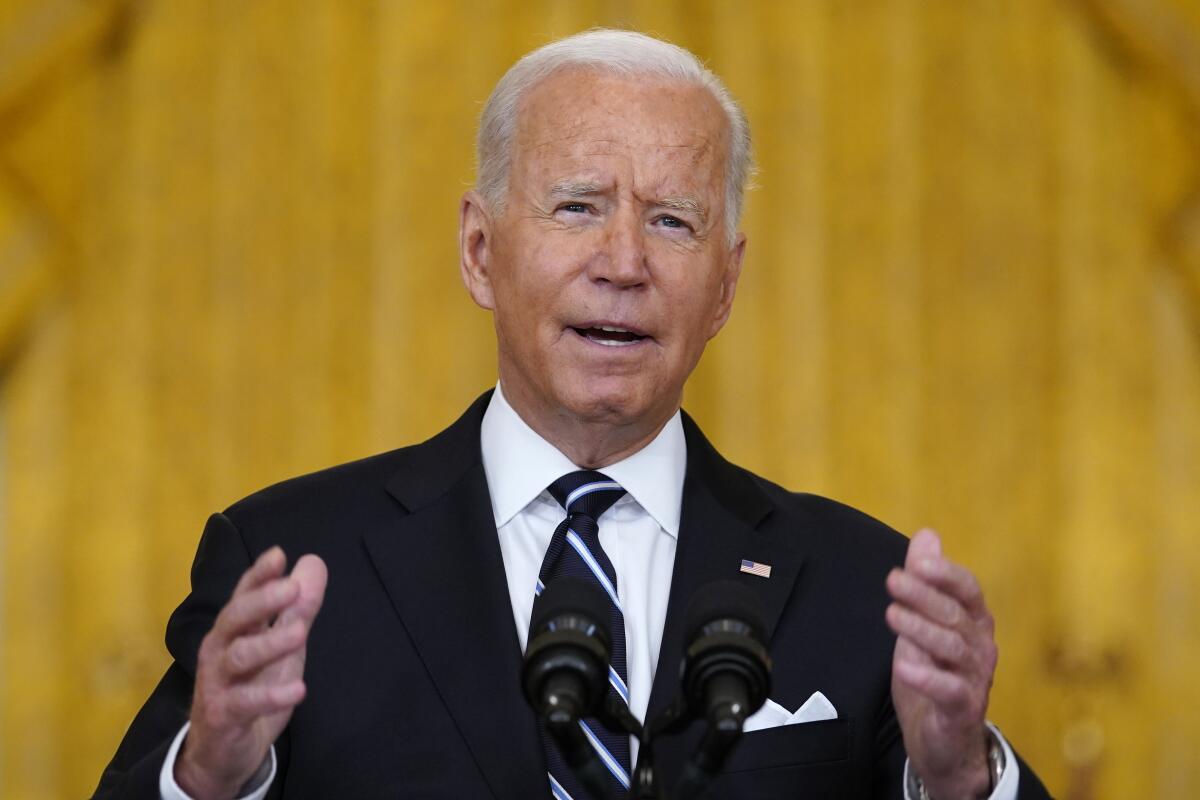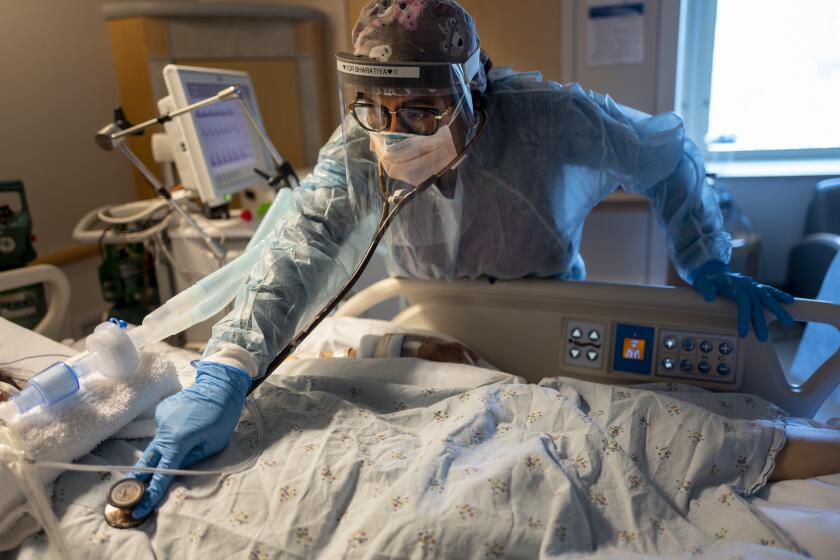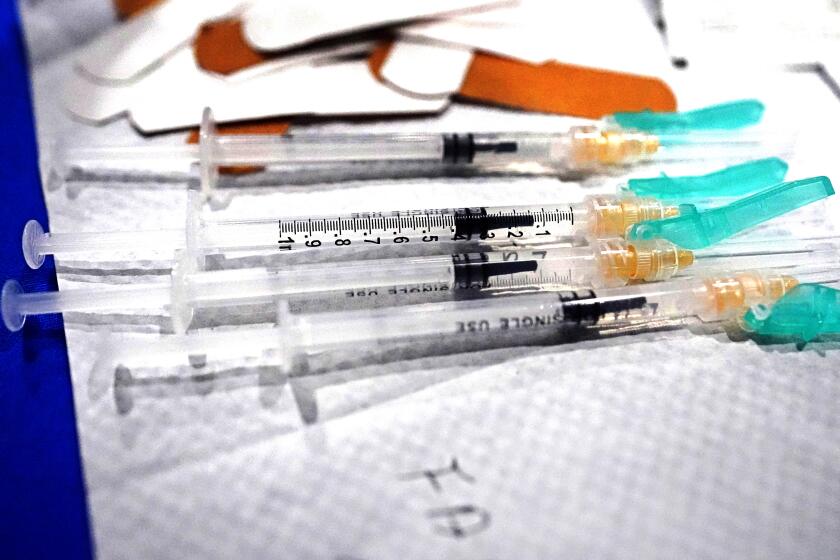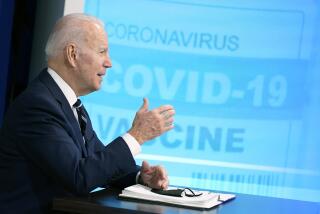Biden outlines plan for COVID-19 booster shots, more vaccine mandates

- Share via
WASHINGTON — President Biden accelerated federal efforts to combat the resurgent COVID-19 pandemic on Wednesday, offering many Americans booster shots starting next month, requiring nursing home workers to be vaccinated and imploring private businesses to mandate inoculations for staff.
“We’re still in a pandemic of the unvaccinated,” Biden said in a speech from the White House. “Quite frankly, it’s a tragedy.”
With cases of the Delta variant rising across the country, the Biden administration said it plans to provide booster shots starting the week of Sept. 20 to adults who had received the two required doses of the Pfizer or Moderna vaccine. People will be eligible to receive the boosters eight months after their second dose, officials said.
Vaccines, the president said, were the most effective protection against the coronavirus, followed by wearing masks.
Biden, keeping his focus on his top domestic priority in a week dominated by a foreign policy crisis in Afghanistan, outlined additional steps his administration is taking to combat the pandemic.
It is requiring nursing homes that receive federal Medicare or Medicaid funding to mandate vaccinations for its staff or risk losing those dollars. And the president threatened to take legal action through the Department of Education against governors that attempt to prevent local school districts from enacting mask mandates.
Biden also sought to pressure elected leaders who “are trying to turn public safety measures ... into political disputes for their own political gain,” a clear jab at Republican Govs. Ron DeSantis of Florida and Greg Abbott of Texas. The two governors have sought to block localities from requiring masks in schools, even as their states are enduring deadly surges in coronavirus infections.
“We’re not going to sit by as governors try to block and intimidate educators protecting our children,” Biden said, adding that money in the $1.9-trillion American Rescue Plan enacted in March could be used to compensate any teacher or administrator whose pay is docked as punishment for requiring masks.
The number of people being infected and falling seriously ill with COVID-19 is no longer accelerating at dramatic rates and even beginning to flatten in some areas.
Biden noted that vaccine requirements “have been around for decades” and long protected Americans from a host of viruses. He urged the private sector to go further in requiring workers to be vaccinated, saying that the country’s continued economic recovery depends heavily on its ability to get the pandemic under control.
“It’s time for employers to stand up,” the president said. “Do the right thing for your employees.”
Ahead of Biden’s remarks, the Department of Health and Human Services announced the plan for booster shots, explaining why a third shot would be necessary.
“Based on our latest assessment, the current protection against severe disease, hospitalization and death could diminish in the months ahead, especially among people who are at higher risk or were vaccinated during the earlier phases of the vaccination rollout,” according to a statement issued by Biden administration health officials. “For that reason, we conclude that a booster shot will be needed to maximize vaccine-induced protection and prolong its durability.”
Boosters will not be rolled out until they receive expected authorization by the Food and Drug Administration, which is evaluating the effectiveness and safety of the supplemental shots, the statement said.
The initial round of boosters will be given to healthcare workers and nursing home residents, who were among the first to be vaccinated.
Health officials said they expect boosters will also be needed for those who received the one-shot Johnson & Johnson vaccine. That vaccine did not roll out until March, and Biden administration officials said more data were needed to assess when those shots might be necessary.
“Our top priority remains staying ahead of the virus and protecting the American people from COVID-19 with safe, effective and long-lasting vaccines especially in the context of a constantly changing virus,” the statement said.
The medical community is not entirely convinced vaccinated adults need a booster shot.
We look at the science behind the need for COVID-19 booster shots.
Dr. Celine Gounder, an infectious disease expert at Bellevue Hospital in New York City, said on Twitter that she did not understand the urgency of deploying booster shots because data have shown that COVID-19 vaccines continue to be effective at preventing hospitalizations and deaths. Rather than starting a widespread booster campaign, she said, it would be more effective to focus on giving boosters to those who have weakened immune systems, nursing home residents and those older than 80.
Health experts have said the Biden administration would be better off improving overall vaccination rates in the U.S. and abroad. Such a campaign has the best chance of beating back the virus and preventing it from mutating, they have argued.
“There’s NOT just a humanitarian or ethical argument for holding off on giving the vaccinated extra vaccine doses,” Gounder tweeted Wednesday. “This is in OUR SELF-INTEREST. Vaccinating the unvaccinated here & around the world WILL PROTECT US BETTER.”
The World Health Organization has urged wealthy countries, like the United States, to defer offering booster shots until more poorer countries have made progress inoculating their populations.
Tedros Adhanom Ghebreyesus, director-general of WHO, told reporters Wednesday that just 10 countries have administered 75% of the world’s vaccine supply. Low-income countries, he said, have vaccinated about 2% of their populations.
“I called for a temporary moratorium on boosters to help shift supply to those countries that that have not even been able to vaccinate their health workers and at-risk communities and are now experiencing major spikes,” Ghebreyesus said. “The divide between the haves and have-nots will only grow larger if manufacturers and leaders prioritize booster shots over supply to low- and middle-income countries.”
More to Read
Get the L.A. Times Politics newsletter
Deeply reported insights into legislation, politics and policy from Sacramento, Washington and beyond. In your inbox twice per week.
You may occasionally receive promotional content from the Los Angeles Times.














